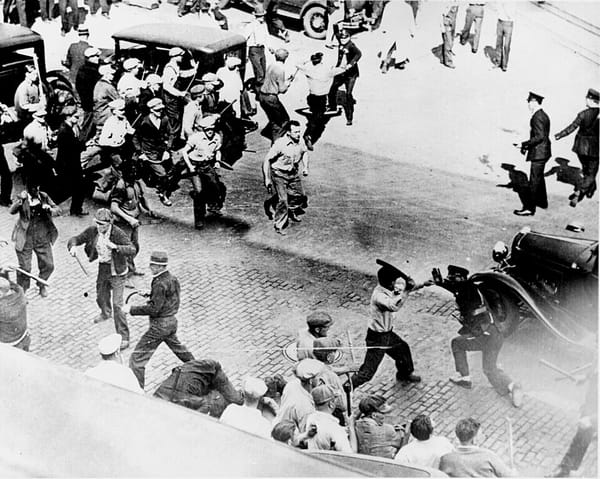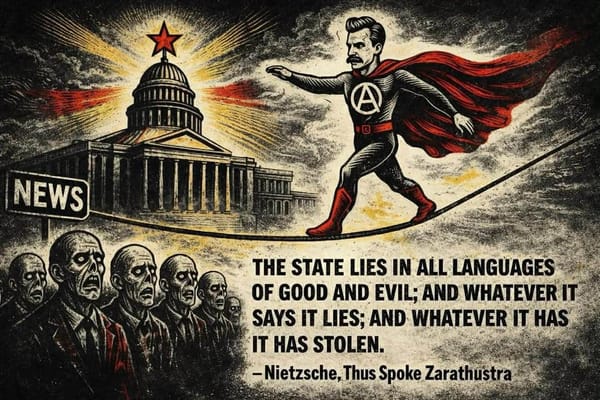The Philosophy of Anarchism

Anarchism is the political philosophy that calls for replacing all relations of domination with relations of free association. We call for this because we understand that human beings sustain ourselves through free cooperation. When we dominate each other the dominated experience the domination as an alienating force that excludes them from the ability to satisfy their needs. The dominator might provide for the dominated, but the dominated will be excluded from satisfying the needs which go beyond the bounds imposed by the dominator.
The dominator in turn cuts themselves off from non-antagonistic collaboration with the dominated. Domination thus undermines the social production that sustains all human life. Relations of free association promote social production because they allow for each member of the association to creatively express themselves in ways that promote the creative expression of the other. This radical conception of freedom produces a theory of the human condition which sees human beings as self-creating through the historical development of social production.
Anarchism is thus philosophically centered on the historical development of the social production process. Since social production originates with and develops with humanity's historical relation to nature the Anarchist philosophical method is one of historically analyzing the social relationships that produce the corporeal human relationship to nature. Karl Marx maintained the same method and ethic of freedom against domination. Raya Dunayevskaya called the former thoroughgoing naturalism and the latter new humanism. Both Marx and Anarchist thinkers like Marx's rival Mikhail Bakunin adapted these views from a radical interpretation of GWF Hegel, one of history's greatest philosophers.
Hegel constructed a holistic philosophical system by analyzing human thought and consciousness as they developed through human culture historically. His method was "dialectical" in that it centered the debate between opposing philosophical systems which tended to resolve in higher systems that preserved what was true in the former systems while adding new insights. As thought progresses in this way, according to Hegel, the idea of freedom is generalized to more and more relations, institutions, and societies. However, because Hegel's focus was the ideal rather than social production his political philosophy ended up in a form of liberalism in which it was the job of the state to equally enforce the freedom of all social classes while carrying out measures to alleviate poverty.
Marx pointed out that this would require the state to somehow stand above modern industrial society to represent the interests of the entire community. This would be impossible since the modern state functions to protect the private property that allows the capitalist class monopolistic control over the production process. This control excludes the working class from directing their own productive activities and thus facilitates the squeezing of labor by capital for a return on investment. As long as class domination persists, then, according to Marx and his Anarchist rivals, universal freedom would be blocked.
Class society, they said, would thus have to be replaced with socialism in which production is under the collective control of all freely associated producers. Doing this would require the workers to take control of society and liquidate the false community of the state into the free community of producers. Since it is the workers who are brought together in modern industrial society to produce social wealth, it is the workers who have an interest in re-founding society on the basis of free cooperation. Anarchists distinguished themselves from the post-Marx Marxist movement via their anti-statism.
Marxists after Marx and Engels tended to interpret worker control of society in transition to socialism as the "workers' state" in which the socialist party was to take control of the modern state and use its coercive power to restructure society and defeat counterrevolution. The Anarchists scoffed at the notion that the hierarchical and bureaucratic machinery of the state could affect the control of society by the oppressed majority, much less the exit from class society. The state requires a hierarchical command structure that uniquely empowers a ruling group with the ability to direct society and thus social production, thereby reproducing class domination and subordinating the laboring classes. It is no wonder for Anarchists that communist regimes produced a new class of bureaucratic elites. Anarchists thus adopted a view of the transition to socialism where the state is replaced by horizontally networked structures of worker control.
Sources
Marxism and Freedom, Dunayevskaya
Marx At the Millenium, Smith
Marx After Marxism, Rockmore
Mikhail Bakunin and Social Anarchism, Eckhart
Peter Kropotkin and Communist Anarchism, Kinna
Hegel, Fritzman
Rise and Fall of World Communism, Breslauer





